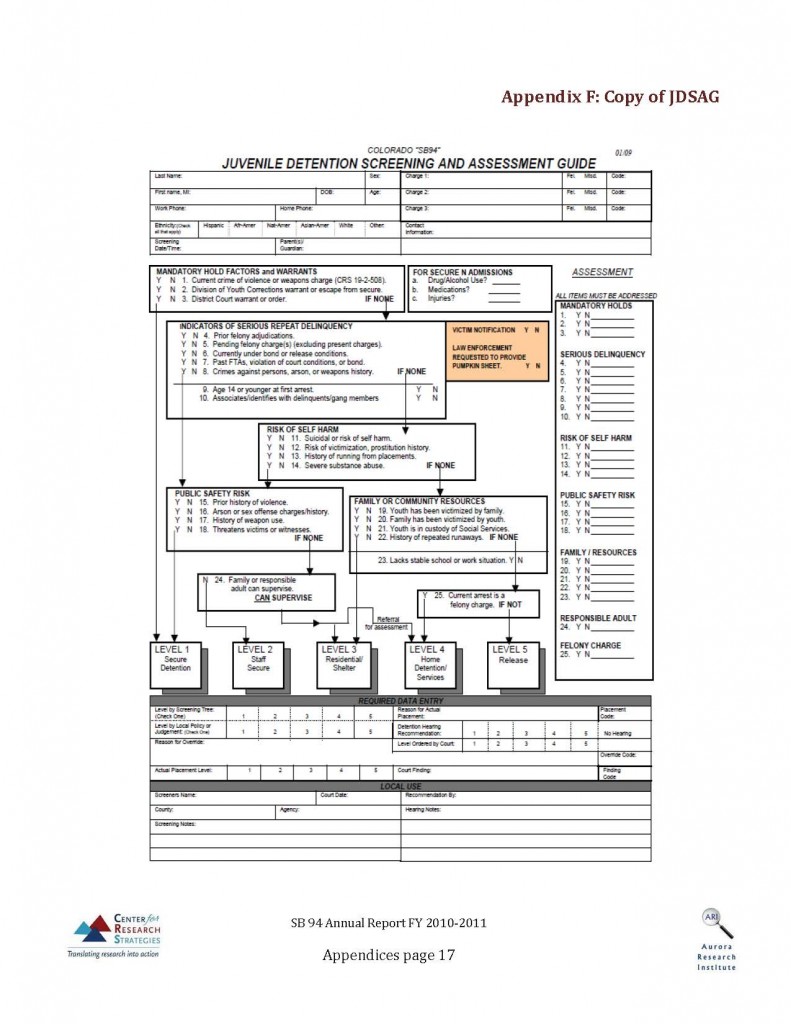






Colorado Juvenile Criminal Cases – The Importance of the Probation Department’s Intake
By Colorado Juvenile Criminal Lawyer – H. Michael Steinberg
The Juvenile Arrest – And Probation Interview
After a young person has been arrested, he—and, in many cases, his parent—will be interviewed by a probation officer. This process is usually called probation intake and typically requires that the probation officer review the child’s record, obtain her social history, and consider the seriousness of the crime alleged.
Colorado has in place what is commonly called an SB94 interview. This is a critically important stage in any serious juvenile case.
The Colorado SB94 Juvenile Screening Process
SB 94 services impacted 8,152 unique youth during FY 2010 – 11.
The SB94 process provides a screening for appropriate placement along the detention continuum, for re-offending risk assessment, for planning for community-based services while the youth is in secure detention and for the provision of community-based services when youth are not in secure detention.
The Colorado Juvenile Risk Assessment (CJRA) Prescreen
The SB 94 screen utilizes the Colorado Juvenile Risk Assessment (CJRA) Prescreen to assess youth risk of re-offending using two separate domains: criminal history and social history. CJRA pre-screening occurs shortly after admission to secure detention.
The CJRA assigns a risk level of low, moderate, or high to each youth. These risk levels are applicable to the juvenile justice population, not the general population. Thus, “Low” risk implies that an individual youth’s risk of re-offending is low relative to other delinquent youths’ risk of re-offending.
• Upon further examination of “Low” risk youth detained without a mandatory hold factor it was found that 34.6% of these youth had a prior history of violence and 30.8% had a history of committing crimes against persons, arson, or a weapons offense.
Colorado Has Been An Innovator In This Area
Colorado has been an innovator in juvenile justice for two decades. At its inception SB 94 was an innovative program incorporating cross system collaboration with best practices in juvenile justice programming. Twenty years later, SB 94 is today – an irreplaceable component of the juvenile justice continuum.
On any given day, only about 20% of youth are detained in a secure or staff-secure setting. The vast majority of detained youth are instead served in the community through SB 94 programming.
The probation officer will make recommendations about:
1) whether the case should be prosecuted, diverted out of the delinquency system, or dismissed
and
2) if the case is to be forwarded to the prosecutor, whether or not the client should be released pending the outcome of the case.
“The most beneficial measures in juvenile delinquency matters appear to be the ones that are centered on the youths’ pre-trial environment and which do not require placement in detention facilities” – Cécile & Born (2009)
This is a list of Colorado Juvenile Detention Centers
Marvin Foote Youth Services Center
Gilliam Youth Services Center
Platte Valley Youth Services Center
Adams Youth Services Center
Pueblo Youth Services Center
Denier Center
Mount View Youth Services Center
Grand Mesa Youth Services Center
Spring Creek Youth Services Center
Youthtrack Alamosa
Brown Center
Midway Remington
Preparing The Juvenile Defendant for The Probation Intake Interview
Before the juvenile meets with her probation officer, some preparatory work can positively influence the probation intake and, possibly, the preliminary arraignment.
A Colorado juvenile criminal defense lawyer can assist the juvenile by:
1) ensuring that the parent and the client are prepared for the probation officer’s interview
and
2) collecting positive social and other relevant information about the client.
The lawyer will also want to get some preliminary information from the probation officer, so the lawyer can discuss options with the juvenile.
Preparing the juvenile and her parent
The Lawyer needs to inform the juvenile and her parent that:
• Regardless of any promise of confidentiality, everything they tell the probation officer may be relayed to the judge and prosecutor.
• They should not discuss the alleged incident with the probation officer. They can explain that the juvenile criminal defense lawyer instructed them not to answer questions about it. At the same time, they should convey that they are all taking this matter seriously, regardless of their feelings about guilt or innocence.
• They should provide as much information about the client’s good behavior and activities as they can. This can include attending school, following rules at home, spending time with friends who are positive influences, etc. The lawyer should remind the juvenile and her parent that exaggerating is not a good idea, because the probation officer may attempt to verify the information independently.
• They need to dress appropriately and behave courteously.
Collecting positive social information about the juvenile
The lawyer needs to be able to take the information given to the lawyer by the client and his parent and use it creatively to present a positive and persuasive picture of the juvenile’s typical behavior.
The lawyer should obtain and verify as much positive information as the lawyer can about the juvenile, including school performance, part-time work, religious and recreational activities, and behavior at home.
He should also get copies of positive academic documents, such as transcripts or any certificates or awards for good behavior or achievement. Ask a supportive teacher, coach, or clergy member to write a letter describing his relationship with the juvenile and his knowledge of his good behavior, such as her regular attendance at school, practices, or services.
The goal is to demonstrate to a probation officer that there are no significant treatment needs, problems, or issues complicating the client’s life that necessitate court intervention.
Negotiating with the probation officer
The outcome of a meeting with a probation officer depends on many factors particular to lawyer’s case and jurisdiction, but the lawyer’s goal is always to advocate for the best possible result for the juvenile.
The lawyer should view the probation intake process as a kind of preliminary form of plea bargaining in which the defense lawyer creatively use the lawyer’s negotiating skills without compromising the lawyer’s ability to proceed to adjudication if necessary.
The idea is to set the here is to set the tone that this particular juvenile is a good kid and that, to the extent some kind of delinquent conduct can be substantiated, it is out of character with the client’s history.
Ideally, the lawyer will be able to convince the probation officer to recommend diversion of the juvenile’s case. However, if the client is clearly innocent—he was not at the scene of the offense, or the victim asserts that he is not the offender, or he has some other clear proof of innocence — the probation officer should be amenable to supporting a dismissal (or to not passing the arrest report to the prosecutor, as is the practice in some jurisdictions).
Going To The Prosecutor – DA
In cases where there is a complete legal (as opposed to factual) defense, the Colorado juvenile criminal defense lawyer will want to go directly to the prosecutor to request the dismissal or negotiate a nolle prosequi (no file).
However, the lawyer should be careful about disclosing alibi witnesses or other defenses too early in the case; however, as the lawyer does not want to provide their names if the lawyer has not investigated the situation.
Asking For Diversion Offer
If the probation officer cannot or will not recommend that the prosecutor dismiss, the next best option is diversion from formal juvenile court processing.
Diversion programs vary from state to state, and Colorado juvenile criminal defense lawyer should be wary of those that mandate that the juvenile admit guilt in order to participate in diversion.
Diversion can, however, provide a good opportunity for a child to demonstrate that she can succeed in the community and to avoid having the alleged offense on her record.
If it becomes clear that, because of the seriousness of the charges or the rules of the jurisdiction, the probation officer must send the juvenile’s case on to a prosecutor, the Colorado juvenile criminal defense lawyer should focus on convincing the probation officer to support a reduction in the severity of the charges.
The SB 94 Evaluation Form
Please Call Us if you have questions regarding:
Colorado Juvenile Criminal Cases – The Importance of the Probation Department’s Intake
H. Michael Steinberg has been a Colorado criminal law specialist attorney for 40 years. For the First 13 years of his career, he was an Arapahoe – Douglas County District Attorney Senior prosecutor. In 1999 he formed his own law firm for the defense of Colorado criminal cases.
In addition to handling tens of thousands of cases in the trial courts of Colorado, he has written hundreds of articles regarding the practice of Colorado criminal law and frequently provides legal analysis on radio and television, appearing on the Fox News Channel, CNN and Various National and Local Newspapers and Radio Stations. Please call him at your convenience at 720-220-2277
If you have questions about Colorado Juvenile Proabtion Based Interviews in the Denver metropolitan area and throughout Colorado, attorney H. Michael Steinberg will be pleased to answer those questions and to provides quality legal representation to those charged in Colorado adult and juvenile criminal matters.
Other Articles of Interest:
- Colorado Habitual Domestic Violence Offender Law – CRS Section 18-6-801(7)
- Colorado Juvenile Defense Case Investigations – By Juvenile Criminal Defense Lawyer H. Michael Steinberg
- Indeterminate Sentence for Sex Offenders (18-1.3-1004)
- Juvenile Crimes Sentencing In Colorado – Aggravated – Violent – Repeat – Mandatory Sentencing Laws – and Sealing a Colorado Juvenile Record
- A Bird’s Eye View of The Colorado Juvenile Justice System
























